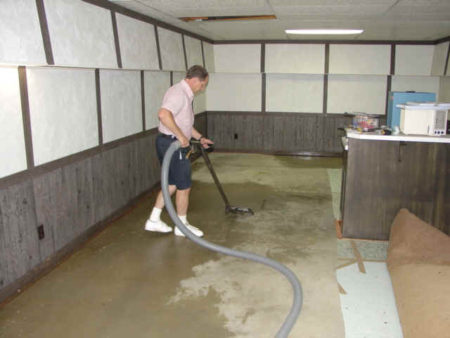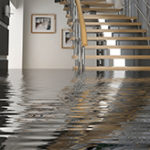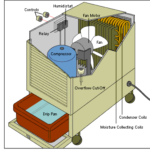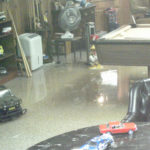My Basement Flooded, Now What?

With all the rain we’ve been getting lately, it’s a high possibility that you’ve been afflicted with one of the homeowner’s worst nightmares: a flooded basement. Don’t panic, we’re going to cover the bases on what needs to be done in this blog, and help you where we can! If your basement hasn’t flooded, it doesn’t hurt to read over this blog to prepare yourself just in case it does happen; it’s better to be prepared and ready to take action as opposed to panicking after all! Before we get too far into the cleanup process, however, we strongly recommend that you call your insurance company right off the bat. There are things they may be able to assist with, and they also need to be kept in the loop about any potential property damage. Let them know what’s happened and the steps you want to take, as that could affect your policy.

Once you get off the phone with your insurance company, put on some waterproof shoes or boots (it would be best if they have a rubber bottom to be extra safe, especially if the water reaches electrical outlets). If you can, go right to your electrical panel and switch off everything connected to your basement immediately. As we know, water conducts electricity and we don’t want you getting a nasty shock. Your next, immediate step, it to remove all moveable electronics. Take them up into a dry location and try to dry them out; chances are they’re pooched, but you might be able to save them if you’re incredibly lucky. Any furniture you may have is next to go up, as it absorbs water and may be unusable. You might be able to save them. If you have a carpeted basement, you’ll need to rip up the carpet and under padding as well, as both absorb and hold moisture.
Now for the fun part, getting rid of the moisture. This could be as easy as mopping it up and dumping the water outside or (if it isn’t backed up) into your drainage system, or as difficult as renting a sump pump or bailing out your basement. What’s important is that you get as much of the moisture out of your basement as possible, as quickly as possibly. As we’ve mentioned in a couple of our previous blogs, moisture in your basement gives mold a perfect growing area which can lead to physical and respiratory complications. We don’t want that at all, so it’s very important you make sure your floors and walls are dry. Check the condition of your drywall and insulation, make sure it’s dry, as they also hold moisture as well.
 A dehumidifier can help considerably well with this, as it removes moisture efficiently, just make sure you plug it into an outlet that hasn’t been touched by the water, or use an extension cord that doesn’t touch the ground (we don’t want it getting into potential moisture and short circuiting). Fans also help move the air, and (if you can) open the windows. The more you air out your basement, the faster and more efficiently the area will dry out. While your basement is drying out, check the conditions of your walls and floor thoroughly. It’s very important to make sure nothing’s been seriously damaged, as if it has, that’s one more thing you’ll need to discuss with your insurance company as you may need to replace the insulation or drywall, possibly even the flooring depending on its state.
A dehumidifier can help considerably well with this, as it removes moisture efficiently, just make sure you plug it into an outlet that hasn’t been touched by the water, or use an extension cord that doesn’t touch the ground (we don’t want it getting into potential moisture and short circuiting). Fans also help move the air, and (if you can) open the windows. The more you air out your basement, the faster and more efficiently the area will dry out. While your basement is drying out, check the conditions of your walls and floor thoroughly. It’s very important to make sure nothing’s been seriously damaged, as if it has, that’s one more thing you’ll need to discuss with your insurance company as you may need to replace the insulation or drywall, possibly even the flooring depending on its state.
Another step you can take is to prevent mold from growing in your home by using a product we highly recommend called concrobium. It’s an all-natural, EPA approved anti-mold mixture that’s recommended even by Mike Holmes. It covers and crushes the mold at the root, and leaves a barrier to prevent further mold growth. This barrier isn’t film-y, and isn’t harmful to pets, young or old family members, and doesn’t require a mask or protective gear to apply. It’s also relatively easy to obtain so it’ll save you yet another headache in that sense.
One more suggestion we have is that you take a look at your electrical wiring situation. If the water came into contact with your outlets, you may want an electrician to come in and check the integrity of your wiring before you think about turning anything back on. The moisture may have compromised the integrity of the wiring and the protective insulation around it, so when you turn it back on, it may short circuit and cause even further issues. This can lead to damaged wiring, potential electrical fires and more. While having someone come and check out the potential problem is another expense, it’s cheaper than a potential fire or complete replacement of the electrical components of your home. Better to be safe than sorry, as we like to say, and we always encourage actions to keep you and your family safe and healthy.
Naturally this can all be avoided if your basement is properly water-proofed, and we here at Ashworth Drainage are more than happy to assist you with that, but we understand that sometimes things happen before you can get to that item on your list of to-do’s; especially since Mother Nature can be rather unpredictable. Otherwise we hope that you’ve found this blog helpful, and we wish you luck and minimal damage in this situation, should it have happened to you.
